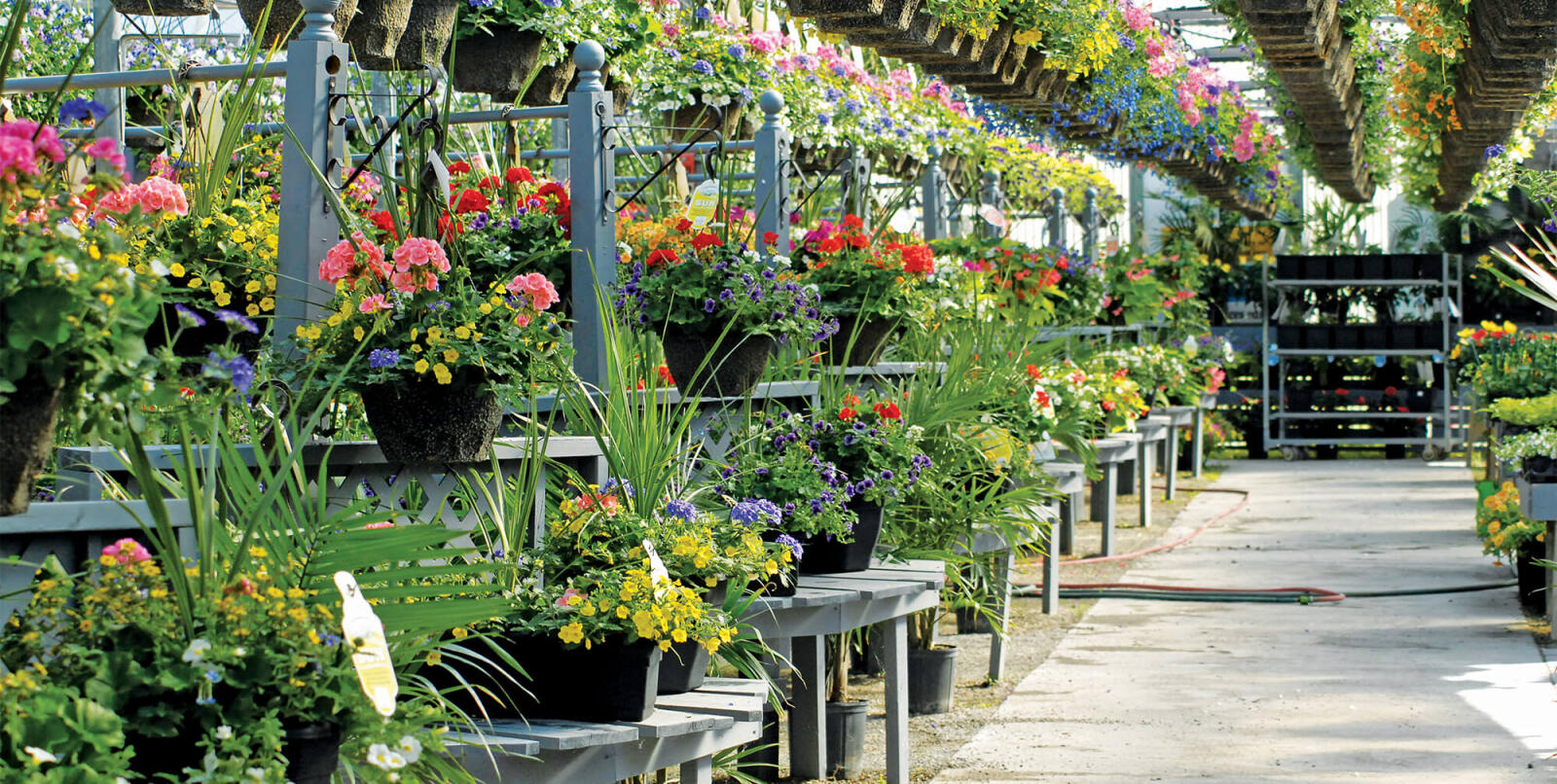March 1, 2016

Providing quality plants in a wide selection with great customer service will keep the independent garden centre successful.
Quality, service and selection
The keys to competing with box stores
BY ROD MacDONALD When I was 16 years old, my aunt Ivy got a job for me, washing dishes at the Hudson’s Bay Company restaurant. It was 1967 and the restaurant was a very busy place. On Saturdays, it was packed and customers had to wait for a table.
When I was 16 years old, my aunt Ivy got a job for me, washing dishes at the Hudson’s Bay Company restaurant. It was 1967 and the restaurant was a very busy place. On Saturdays, it was packed and customers had to wait for a table. From the dish room, I worked my way up to being a short order cook on the grill. If you wanted a cheeseburger, I was your guy. I know I shouldn’t brag.
From the grill I moved to the parkade. I loved that job. There was another student and we were supposed to walk around from level to level to ensure no tampering with the customer’s cars. There was no tampering, so we became self-appointed customer service representatives; assisting elderly customers with backing out, finding cars on level four that the customer thought was parked on level two, opening cars when the keys were locked inside and so on. We received many compliments for our service. As an aside, the other student who worked with me was John Hobbs, the brother of Thomas Hobbs, the well known owner of Southlands in Vancouver. Sometimes Canada is not such a big place.
At that time, the Bay was a highly organized store, with customer service in abundance. In menswear there was a tailor working full-time, altering customer purchases. A customer in any department rarely had to wait more than a minute for a competent sales person. It was, in essence, the way I learned to do business. I learned there are no unimportant jobs in any business. What does it matter how gourmet the chef is, if the cutlery is dirty? I learned the importance of details and I was proud to work there.
Flash forward some 47 years and it was time for me to revisit my past. The Bay had a flyer in our newspaper, and two items appealed to me. I headed downtown for one of my rare shopping expeditions. It was two weeks before Christmas, and I assumed there would be many customers and lots of seasonal staff to assist the regular employees. How wrong could I have been?
I wanted to replace my non-stick frying pan that had quit being non-stick several years ago. I could not find the pans. There were several customers in the kitchen area but no staff members. I crossed over to the Christmas shoppe, which was quite large, and there were no staff there or in the bath shoppe. Back to the kitchen shoppe and after another go round, I found them — at the cash register were two employees, and that was all I could find for the entire floor.
I thought back to when I bought my first house in 1973 and I needed a set of pots. I was greeted by a saleswoman upon arrival at the kitchen area who asked how I cooked and what I liked to cook. She dissuaded me from purchasing what I thought I should buy, instead selling me a set of cookware that she assured would meet my needs in a much better fashion. That pot and pan set was indeed the right choice for me, even though I did not know it at the time. That is a memory of excellent service. I had been well looked after.
My next acquisitions were a couple of dress shirts. Menswear was on the second floor, so up I went. Unfortunately, no matter how many times I searched the dress shirt area, I could not find the advertised products I wanted. Again, I could not find a single staff member to help me. I had given up and was headed towards the exit when lo and behold, there were the shirts I was looking for. Now, why hadn’t I thought to look for dress shirts in the aisle adjacent to the jeans and parkas?
I picked out my shirts, headed to the cash register and was greeted with the standard, “Did you find everything you were looking for today?” My response was a simple “I found everything except a staff member to assist me. Do you have anyone working on this floor, besides yourself?” He assured me there was. From his cash stand, we had a wide spectrum of the floor. We were able to see nearly the whole store and he was unable to point out a single staff member. He was embarrassed and so was I.
Race to the bottom accelerates...
Just when I think the race to the bottom has found its bottom, I am surprised, yet again. I have been in a box store garden centre and watched as a customer pushed the call button because there was no one to assist her. Someone eventually arrived from plumbing. I leave you to figure that one out. The customer wanted to know if spireas grow in the shade. The plumbing guy reads the tag as the woman shouts “I know how to read!” It was a truly priceless moment.Besides the tag readers and the no-staff-available scenario, there are the staff members who really don’t know, so they improvise. I often tell of a box store garden centre manager who thought strawberry dianthus was two separate plants. At another store, a plant manager could not comprehend that all plants have a common name and a botanical name. To her, there was only one name for a plant, because after all, “I have been here for two months,” she lectured.
We know this because we have all heard similar stories from our customers, our staff and our family members. The bottom is continually being reinvented. We have now moved from poor service to no service. What a brilliant way to save money!
The question needs to be asked and answered: Should we follow? If you have a keen desire to go out of business, then of course the answer is yes. Most of us have a strong desire to avoid bankruptcy and to thrive. For us, the answer is simple.
Inevitability of change
The marketplace is a living entity, constantly evolving and changing. From the 1900s until the 1960s, every neighbourhood had its own family-run grocery store. Every home in the area had a credit account that the dad would address every two weeks when he was paid. There were over 100 stores like that in Regina, and today only one is left. The supermarkets have dominated for the last 40 years and even the smaller supermarkets are being replaced by the mega supermarkets. Good or bad, that’s the way it is. In our wildest dreams in the 1970s, we could have never envisioned a grocery store as large as Costco.Among us, there has always been those greenhouse and garden centre retailers, when witnessing a downturn in sales, became creative writers to explain the event. In Regina in the ‘70s, one greenhouse owned the market place. They were the ‘go to people’ for plants. As their market share grew, their quality and service decreased. Their sense of entitlement and arrogance allowed them to believe they could get away with anything. It did not take long for that stinky (I could have used a fancier word but that one fits perfectly) attitude cost them their business. Their explanation to me was that “people are no longer loyal.” They could not comprehend that loyalty is earned, not given unconditionally. The golden goose was gone, at least for them.
As the quality of plants improved, both in breeding and growing procedures, there were those who refused to change. They were still growing the same old varieties in peat pots and mud. A dozen tomato plants would often weigh three pounds. It took a strong employee to lift a flat. Those who refused to change were swallowed up by marketplace evolution.
Understanding our niche
Where do we fit in this market place evolution? Our future lies in realizing there are four components to each and every sale: quality, service, selection and price. We can never be price leaders but we have always been the leaders in the other three areas. That is where the box stores cannot compete. I have preached from the pulpit on the quality issue before; the box stores do not know how to define quality, let alone sell it, but we do. We invented quality. The box stores do not know how to define service or how to sell it, but we do. We invented service. The box stores do not know what selection is, but we do. We understand that there is more than one shade of yellow marigolds and so do our customers.Our game is quality, service and selection. We know not everyone wants to shop at Walmart. We look after those customers who want services the box stores cannot offer. That is our game and we stick to that plan to keep ourselves on the road to success.
Rod McDonald owned and operated Lakeview Gardens, a successful garden centre/landscape firm in Regina, Sask., for 28 years. He now works full-time in the world of fine arts, writing, acting and producing in film, television and stage.